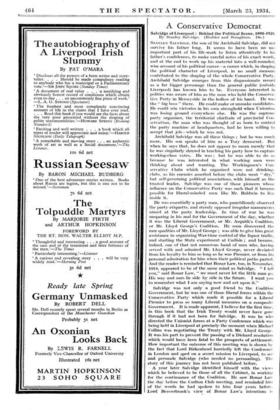A Conservative Democrat
Salvidge of Liverpool : Behind the Political Scene, 1890-1928.
By Stanley Salvidge. (Hodder and Stoughton. 18s.) STANLEY SALVIDGE, the son of Sir Archibald Salvidge, did not survive his father long. It seems to have been no un- important part of his life-work to listen attentively to his father's confidences, to make careful notes of his exact words, and at the end to work up his material into a well-rounded, wise account of his political career—a career which, in shaping the political character of Liverpool, in no small measure contributed to the shaping of the whole Conservative Party. Archibald Salvidge emerges from this dispassionate record as a far bigger personage than the general public (outside Liverpool) has known him to be. Everyone interested in politics was aware of him as the man who held the Conserva- tive Party in Merseyside in the hollow of- his hand. He was the " big boss " there. He could make or unmake candidates. He could win victories in his own stronghold when Unionism was losing ground everywhere else. He was the supreme party organizer, the territorial chieftain of provincial Con- servatism, the man who was thought of as born to control the party machine at headquarters, had he been willing to accept that job—which he was not.
Archibald Salvidge was all theie things ; but he was much more. His son speaks of him as a Tory democrat. But when he says that, he does not appear to mean merely that he was singularly shrewd in teaching his party how to capture working-class votes. He was ; but he was able to do so because he was interested in what working men were thinking about and wanting. The Workingmen's Con- ser•ative Clubs which he organized were not drinking- clubs, as his enemies asserted before the clubs went dry," but self-governing political associations, with himself as the trusted leader. Salvidge was one of those pioneers whose influence on the Conservative Party was such that it became possible for liberal-minded men like Mr. Baldwin to live inside it.
He was essentially a party man, who punctiliously observed the -party etiquette, and sternly opposed irregular manoeuvres aimed at the party leadership. In time of war he was unsparing in his zeal for the Government of the day, whether it was the Liberal Government, or Mr.. Asquith's Coalition, or Mr. Lloyd George's. Coalition. He soon discovered the rare qualities of Mr. Lloyd George ; was able to give him great assistance in organizing War-time control of the liquor traffic, and starting-the State experiment at Carlisle ; and became, indeed, one of that not numerous band of men who, having
served with and admired Mr. Lloyd George, never deviated from his loyalty to him so long as he was Premier, or from his personal admiration for him when their political paths parted.
And the reader is reminded that Bonar Law, too, in November. 1918, appeared to be of the same mind as Salvidge. " I tell you," said Bonar Law, " we must never let the little man go. His way and ours lie side by side in the future. I want you to remember what I am saying now and act upon it."
Salvidge was not only a good friend to the Coalition Government, but he was one of those liberal forces within the Conservative Party which made it possible for a Liberal Premier to press so many Liberal measures on a composite Government. It is made apparent, I believe for the first time, in this book that the Irish Treaty would never have gone through if it had not been for Salvidge. It was he who directed the Unionist forces at a Party Conference which was being held in Liverpool at precisely the moment when Michael Collins was negotiating the Treaty with Mr. Lloyd George. It was his part to prevent the passing of a Diehard resolution which would have been fatal to-the prospects of settlement.
How important the outcome of this meeting was is shown by the fact that Lord Birkenhead hurriedly left the Conference.
in London and sped on a secret mission to Liverpool, to see . and persuade Salvidge (who needed no persuading). The story of this journey has not been published before.
A year later Salvidge identified himself with the _ views which he believed to be those of all the Cabinet, in working for the continuance of the Coalition. He saw Bonar Law the day before the Carlton Club meeting, and reminded him of the words he had spoken to him four years before. Lord Beaverbrook:s view of Bonar Law's intentions is
wrong ; -for' the' latter sadly replied that the position had changed ; • that he had made up his mind in the interests of the party to declare against the Coalition ; and I hat, in any case, Salvidge was mistaken in supposing that all the Cabinet was standing by the Premier. " I may as well tell you," he said, " that Lord Curzon is here. He is waiting in another room." And when Salvidge went round to Downing Street and told the assembled Cabinet what was now certain to happen at the Party meeting on the morrow, a voice was heard to exclaim " So our punctilious Pro- consul has ratted, has he ? " The voice was not Mr. Lloyd George's. Among all the members of that Cabinet about to perish there was only one cheerful person, full of Ugh spirits, and free from bitterness—the Prime Minister himself. I can recall no more striking passage in recent political memoirs than the extract from the author's diary describing the last hours of the Coalition Government. There are not many persons who would confess to sharing his views, but it is evident that to Salvidge at least it was as if a light suddenly had gone out in the political world.
R. A. Scorr-JAmEs.































































 Previous page
Previous page